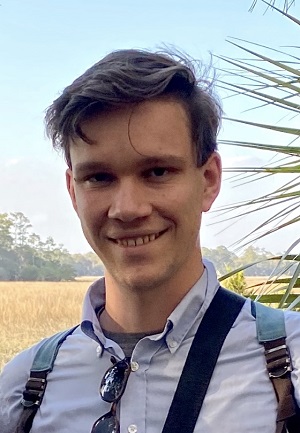
A Net the World Always Escapes
Contributor’s Marginalia: Forester McClatchey responding to Caitlin Doyle’s poem “Not It”
The dog sprinted off our porch, chasing the snarl of a FedEx truck, and later that morning we buried him. We took him to the woods. It was cool and bright, with steam rising from decomposing leaves. We dug a clumsy hole, pickaxing through hickory roots, and when it was done, we decorated the grave-floor with bigleaf magnolia leaves. I acted on this impulse without understanding it. We merely did it, my wife, my three-year-old niece, and I, picking the massive, comical leaves and laying them overlapping in the hole. Then we went home and waited for grief.
*
People need patterns. It’s not an intellectual need; it’s not abstract. When something large thunders into our life, we cling to patterns, rituals, funerals, weddings, pop songs, family recipes. One fundamental misunderstanding of poetic form I have encountered is that it’s ornamental. Form is not ornamental. Form is a bed of magnolia leaves for the cooling body of a dog.
*
Caitlin Doyle’s poem “Not It” trots along in hymn meter, a difficult form that alternates iambic tetrameter and trimeter. Her take on the form opts for sly slant rhymes (late/not, one/down), breathy enjambments, and lots of double negatives (“and you’re not not the one /who’s never not been running out / of breath”). The poem dances around the dread of lost youth, the fear that time has passed you by, lifting to the reader’s lips a spoonful of what E.A. Robinson calls “the blank taste of time.” It opens as a memory of hide-and-seek, but quickly veers. Before you know it,
the game’s gone on and on,
and now you’re It, you’re It,
and now you’ve always been alone
without a hiding spot,
with friends to find who can’t be found
because it’s late, too late,
for anything but how the wind
makes ghost-chimes of the Not
The thirty-two line poem consists of one long sinuous sentence. There is nowhere to stop and breathe, and that’s part of the point. The poem enacts the claustrophobia of loneliness.
*
Elephants have been observed covering corpses with branches and leaves. They walk in circles around a dying calf. They stand vigil, or make loud, repetitive sounds. There’s no way to know what elephants think about death or loss, if “think” is even the right word, but we can read their behavior like an image or a sound. Sometimes, in response to death, elephants make something. Something that has shape. They visit it, again and again. So perhaps there is something in nature that responds to loss by asserting order. Perhaps in this we are not alone.
*
“You’re not not the one,” the speaker says,
who can’t stop counting down
from ten to one to Ready or Not
to here I come again,
as night turns day and day turns night,
and you’re not not the one…
I tell my students that repetition stirs up emotion (think of the piano in a sad Adele song), but I do not explain why. I wonder if there is an explanation. Probably there is a sophisticated explanation, but I wonder if there is a true one. Caitlin Doyle repeats several phrases (“you’re not not the one,” “Ready or Not,” “Here I come.”), chopping and blending them until, like a word uttered a hundred times, they leak the bright fluid of meaning. Denotation fades. Music obtains.
Reading this poem feels like being a child and spinning in a circle to savor dizziness. It is one of the paradoxes of poetic form that it disorients and organizes simultaneously. Form’s neat rectangles are windows into mystery:
You’re not not the one
with grown up clothes that finally fit
who shouts, “Not It! Not It!”
What is pursuing the speaker? Death? Time? No abstraction seems appropriate, because whatever it is, whatever dreadful thing pursues the speaker through the poem’s fugitive syntax, it lives in the poem’s sound. It moves in repetition, in half-rhymes, in chiasmus, in the dance of hymn meter. As Flannery O’Connor observes, “Art transcends its limitations only by staying within them.” (Doyle epigraphs this quote in “Flannery at Andalusia.”)
Poetry attempts to restrain strong emotion with careful language. Speaking crudely, poems throw a net of form over the havoc of the world. Yet there is a paradox here. The eeriness of Doyle’s poem, its atmospheric menace, comes precisely from its formal techniques. The world pulses through the squares of the net, caught but angry.
*
After the dog’s death, we laughed a lot. We made jokes at the dog’s expense, at our own expense, trying to pluck ourselves out of grief. The bigleaf magnolia thing was slightly funny, too. Like an ancient ritual. Leaf grief. Human attempts to order the world are always laughable. We are so small. No matter how orderly our lives seem, no matter how much power we seem to wield, our lives remain pathetic. As in “full of pathos.” Lovable. There is pathos in form, in the attempt to organize, because there is pathos in failure.
*
When a toddler builds a tower out of wooden blocks, and the blocks collapse, there is a moment when you do not know if he will laugh or scream. Neither does the toddler. Formal poems dwell in that moment. After the collapse, before the laughter. Or the scream. You don’t know which. You’re “not not the one”
in grown-up clothes that don’t quite fit
who can’t stop counting down.
Counting down to what? The part where the seeker opens his eyes. The part where the game gets real. The game begins when the counting stops. We are always getting ready.
